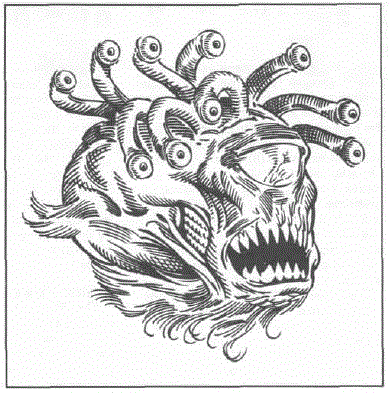
| Climate/Terrain: | Space |
|---|---|
| Frequency: | Very rare |
| Organization: | Solitary |
| Activity Cycle: | Any |
| Diet: | Omnivore |
| Intelligence: | Genius (17-18) |
| Treasure: | As beholder |
| Alignment: | Neutral evil |
| No. Appearing: | 1 |
| Armor Class: | 0 |
| Movement: | Fl 3 (B) |
| Hit Dice: | 40 hp + 5/lvl |
| THAC0: | 11 |
| No. of Attacks: | 1 |
| Damage/Attack: | 2-8 |
| Special Attacks: | Magic |
| Special Defenses: | Nil |
| Magic Resistance: | Nil |
| Size: | M (3'-5' diameter) |
| Morale: | Fanatic (18) |
| XP Value: | 11,500 + 500/lvl |
Though beholders are exceptionally intelligent, they have found little success in learning magic. Most have contented themselves with the natural abilities of the eye tyrant.
Why can’t beholders manipulate the magic that flows so freely through their bodies? The reason is their central eye, that produces the anti-magic ray. Its energies effectively “short circuit” the creature’s magical potential.
A beholder can learn magic if its central eye does not function. The first beholder magi were born blind in this eye and learned magic to compensate. Others ruthlessly put out their own eyes, though these fanatics are nearly always outcast from all beholder nations.
Combat: Like human wizards, beholder magi learn their art gradually and gain different power levels. For a random determination of a beholder mage’s level, roll on the chart below. Note that although the percentages of low level mages are much higher, these numbers reflect those likely to encounter an adventuring party.
Like all beholders, the spellcasting variety focus their magical energies through their eyestalks. Projecting spells through an eyestalk changes the focus of that eye so that the original power is lost forever. Of course, the mage may learn a spell that duplicates the lost ability.
When creating a beholder mage, determine which eyestalks have become spellstalks. Most beholders change their eyestalks into spellstalks in the following order: charm person, sleep, slow, fear, cause serious wounds, charm monster, flesh to stone, telekinesis, disintegrate, and death.
Once an eyestalk has become a spellstalk, the beholder mage “stores” in it any one spell that it knows. Storing a spell requires the same time a human wizard would need to memorize that spell from his book. Once a spell is stored in an eyestalk, the beholder mage may use it as often as desired, in the same way it uses the innate powers of its other eyestalks.
Once a beholder mage knows a spell, it no longer requires a book. It is still limited to the maximum number of spells allowed by its Intelligence. The maximum spell level it may learn is determined by its level, as shown on the chart below:
| Roll | Lvl | Spellstalks | Max. Spell Lvl |
| 01-10 | 1 | 1 | 1 |
| 11-28 | 2 | 2 | 1 |
| 29-50 | 3 | 3 | 2 |
| 51-70 | 4 | 5 | 2 |
| 71-85 | 5 | 7 | 3 |
| 86-94 | 6 | 8 | 3 |
| 95-00 | 7 | 10 | 4 |
The choice of spells is limited by several factors:
First, the beholder mage’s inability to gesture or manipulate materials limits it to spells that can be cast in less than one round, unless the spell’s only component is verbal.
Second, they may not take any spell that affects spell capacity or other spells. Spells like Rary's Mnemonic Enhancer and extension are unavailable to them.
Third, and most important, all beholders are more limited in their understanding of magic than are humans. So beholder magi may learn spells from only one school of magic. Even so, they receive none of the benefits of a specialist wizard.
Beholder magi can use only the number of eyes that a common beholder may use, as explained in the Monstrous Compendium. When rolling for the eyes that may be used, substitute spellstalks for the eyestalks they replaced.
Like ordinary eyestalks, spellstalks can be severed. The beholder mage loses that eye’s stored spell until the stalk can regenerate. A spellstalk grows in “blank,” and the beholder mage must relearn the spell to store in it.
Habitat/Society: Beholder magi are more solitary than their spacefaring companions. In temperament, they resemble the avaracious groundling[1] beholders detailed in the Monstrous Compendium. However, they are less aggressive and more prone to negotiation, or better said, trickery.
Beholder magi who have dispensed with their telekinesis power cannot manipulate their spell books or other magical devices. Therefore, they sometimes employ charmed servants to turn pages and carry possessions.
Ecology: Some potions use the eye of a normal beholder as an ingredient. Substituting the spellstalk of a beholder mage produces unpredictable, sometimes bizarre results. Roll on the Potion Compatibility table on page 141 of the DMG.
In all cases where only one of the two potions being mixed functions, the potion being created is the one that works. When it states that both potions function, the second effect is that of the spell stored in the spellstalk when it was removed.
Archivist's Footnotes
- The term "groundling" is a generic term that is used to refer to people, creatures, items, objects and ships that originated on or are native to a world or planet as apposed to wildspace in the Spelljammer campaign setting. Groundling and spacefaring beholders both share the same monster statistics.
